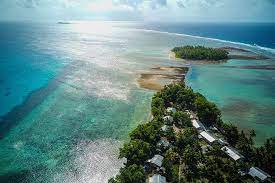Small island developing states (SIDS) are facing an uphill struggle to recover from the impact of the pandemic, which has deepened their financial and economic vulnerabilities, according to the United Nations Conference on Trade and Development (Unctad)
Last year was an exceptionally challenging year for SIDS, which are at least 35 per cent more susceptible to external economic shocks than other developing nations, Unctad said in its Development and Globalisation: Facts and Figures report on Thursday.
While these countries are a diverse group, they share a number of socio-economic and environmental challenges and witnessed an estimated 9 per cent decline in their gross domestic product in 2020, compared with a 3.3 per cent drop in other developing countries, the report said, citing figures from the International Monetary Fund.
The economies of the 38 SIDS recognised by Unctad are largely dependent on travel and tourism. Spread across the Caribbean, the Pacific Ocean, the Atlantic, the Indian Ocean and the Mediterranean, these countries includes some of the most popular tourism destinations in the world. They also include island nations with more developed economies, such as Singapore.
Their reliance on the travel and tourism sector to earn foreign exchange revenue made them more vulnerable to the Covid-19 pandemic, which tipped the global economy into its worst recession since the 1930s, forced border closures and severely disrupted the travel and tourism sector.
The world economy is bouncing back and is expected to expand by six per cent this year, according to the IMF. However, the tourism sector faces a more uncertain outlook amid second and third waves of the virus in parts of the world.
Revenue in the global tourism industry fell 74 per cent year-on-year in 2020, leading to US$1.3 trillion in lost export revenue. The sector is unlikely to recover to pre-pandemic levels until 2023, according to the UN World Tourism Organisation.
The economies of tourism-dependent island nations suffered an estimated 70 per cent drop in travel receipts in 2020, which are “an essential source of jobs and livelihoods”, according to the UNCTAD report.
“Many SIDS have built strong service economies [and] the service sector accounted for over 70 per cent of SIDS’ GDP in 2019,” the report said. “On average, two in three people work in services in the island economies, half of men and three in four women, often in jobs related to tourism.”
On average, exports of services contribute 25 per cent of SIDS’ GDP. These countries generally have an import surplus and almost half of their exports are from the travel sector. As a result, 24 of the 38 nations had a negative trade balance comprising more than 55 per cent of imports in 2020.
Their remoteness poses a significant challenge to their recovery, especially the most isolated Pacific island nations.
The countries’ often weak, financially vulnerable institutions are also a stumbling block to a return to growth.
“SIDS are among the most indebted developing countries in the world,” UNCTAD said. “In 2019, external debt accounted for 62 per cent of their GDP – a record high, mostly driven by increases in short-term debt and private debt, said Unctad.
SOURCE: THE NATIONAL NEWS/PACNEWS














